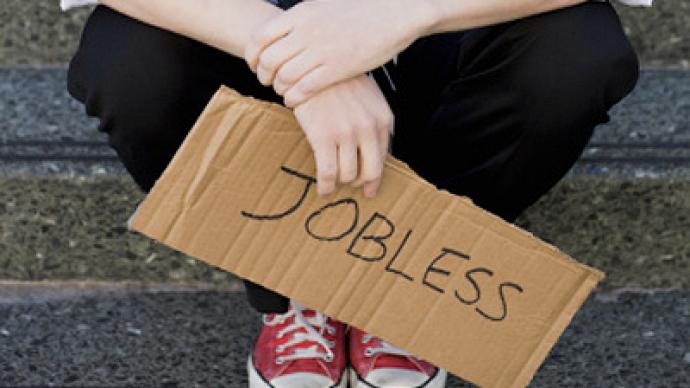Stimulus failure may bring austerity to America

An economic indicator of just how bad things have gotten. They are known as ninety-niners, jobless Americans, no longer receiving unemployment benefits.
The group has grown to roughly 4.5 million since the stimulus plan of 2009 which cost $787 billion US dollars.“I’ve been through, the two years…being able to pay my bills and not damage my credit, I think I went over forty grand already,” said Connie Kaplan, a 99’er.“I do find myself juggling in terms of what bills are going to be paid,” said Candida Haynes, also a 99’er.Obama’s stimulus plan has reportedly saved or created 1.6 million jobs. Yet 2.9 million have reportedly been lost.Critics say behind the fuzzy math, lays a list of failures. “As a fix for the economy, it failed. As a public relations effort, it failed. As an intelligent application of resources it failed. The number reason is this; forty percent of it was tax cuts,” said Larry Beinhart, an author and journalist.Case in point, General Electric. The corporate giant received nearly twenty-five million dollars in stimulus grants. In return, 18,000 US based employees were laid off.“The expectation of working hard and being ok because you worked hard, is just not a given anymore,” said Haynes.The stimulus plan promised to produce jobs, increase production, investment, and consumer confidence.“It really hasn’t done anything. Wall Street came right back up. They cheated on the rules. They’re foreclosing property that they don’t even own,” said Lynn Taylor, a retired New Yorker supporting unemployment extensions.While Wall Street is on pace to dole out record breaking salaries and bonuses this year, main street has faced crippling unemployment and fueling foreclosures that has reportedly forced more than 3 million families from their homes.Meanwhile, vacant storefronts and struggling business owners have come to reflect an American dream gone dark. Consumers are purchasing less and saving more, this has further injured an economy that depends 70 percent on spending.Around 300-billion stimulus dollars went towards tax cuts and credits. Roughly half went to job growth projects like building bridges and roads. Yet many of the “shovel ready projects” haven’t even broke ground.Nearly two years after the launch of the much touted stimulus package, unemployment hovers around 10 percent and another 20 percent are likely underemployed, leaving this era of so called American recovery, arguably mistaken for an era of Americans struggling to survive.Karl Denninger, the founder of The Market Ticker, said it is unlikely a bipartisan solution to America’s economic troubles can be found; explaining partisanship is what Washington is all about. US President Barack Obama has now announced a proposed federal pay freeze which would limit federal employee pay raises over the next two years. Currently, this is a proposal, as the president does not have the authority to enact such a policy. “The freeze is a symbolic gesture,” he explained. “It really doesn’t do much.” The next few weeks of the lame duck Congress will likely accomplish very little on economic policy, due to partisanship. America is “hosed” and there is nothing we can do about it, argued Denninger. But it is important to note that economic concerns are not just an American problem, they are global. “We’ve seen it now in Ireland, we’ve seen it in Greece of course, and we’ve saw it everywhere except in Iceland where the government there told the banks to stick it,” he said. He explained as national governments bailout banks they are merely taking the bad debt from one credit card and putting it on another, inhibiting the ability of governments to borrow money or balance a budget, leading governments to cut more programs through austerity measures.Widespread protests in Europe have been the people’s response. The same reactions will eventually come to America, Denninger argued, that is if the US government is forced to cut back on programs or increases taxes, actions Denninger insists will take place eventually. Thus far there has been little outrage in the US, but the government has not reduced unemployment benefits, Medicare funds, social security and other social welfare programs like many European governments have already done. If European style austerity reaches US policy, Americans will, like their counterparts abroad, be outraged.
In the next few months, the US may indeed face an Irish like crisis, argued Joe Weisenthal, the deputy editor of The Business Insider.“Some factions of the incoming Congress are so aggressive about wanting to cut the spending right now that they are actually threatening to not vote for a hike in the debt ceiling. Some people think that if that were to happen, if the House or the Senate didn’t approve a hike in the debt ceiling, that essentially the US would very quickly default on its debt, not because the US ran out of money, but because the Congress refused to pay it,” he explained.It is unlikely an Irish style crisis would occur naturally in the US, but one could be induced by bad decisions in Congress. Such an event could pressure the US into austerity measures. If austerity comes to America, protests and public reactions will occur, he argued. They may not be as violent as in Europe, but there will be outrage. “When you take away people’s money, their jobs, that’s how they are going to respond,” said Weisenthal. The most likely scenario that could work for America would have to involve a “down the road” sacrifice, such as reducing the longer term costs of Medicare, social security and programs like that which do not immediately inflict financial pain.













